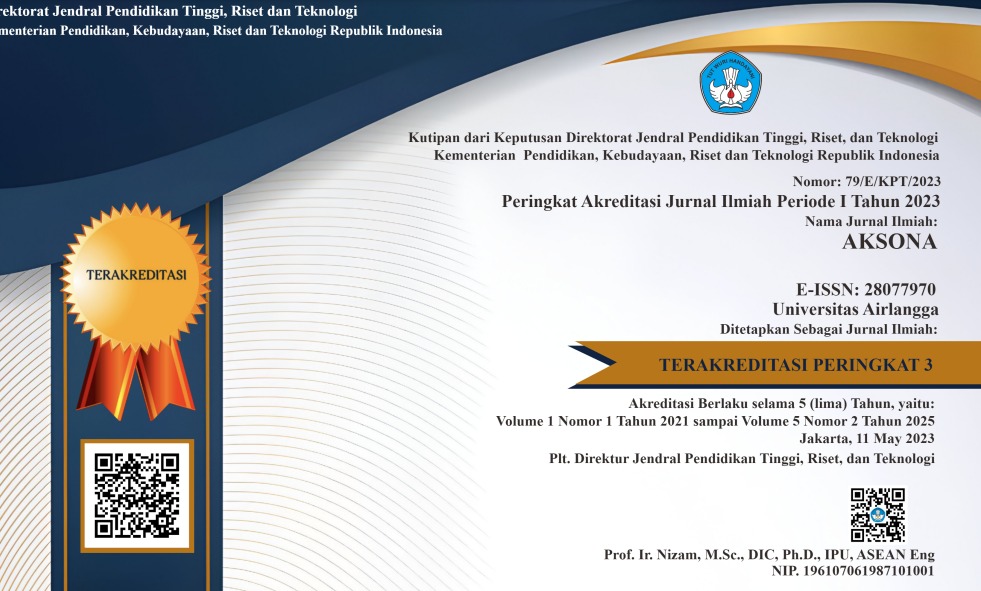Hemorrhagic Wallenberg Syndrome Accompanied by Horner Syndrome at Young Age
Downloads
Highlight:
- Wallenberg syndrome caused by medulla oblongata hemorrhage with good functional outcome.
- Wallenberg syndrome is accompanied by Horner's syndrome, which occurs at a young age.
- In patients with Wallenberg syndrom, conservative management and medical rehabilitation are used.
ABSTRACT
Introduction: Wallenberg syndrome is a rare syndrome involving the medulla oblongata, an uncommon hemorrhage site. It is also known as lateral medullary syndrome or posterior inferior cerebellar artery syndrome. Wallenberg syndrome has several symptoms that can be divided into vestibulo-cerebellar, bulbar, autonomic, sensory, and atypical. Case: A 27-year-old man came to the emergency unit complaining of dizziness and swinging, as well as a left eyelid that did not open completely, a lack of sweat on the left side of the face, a hoarse voice, swallowing disturbances, hiccups, decreased hearing in the left ear, and a lack of sensation on the left side of the face and the right side of the body. The patient tended to fall to the left and was unsteady when standing. Physical examination revealed Horner syndrome, bidirectional nystagmus, left dysdiadochokinesia, and left ataxia. A CT scan of the head showed a left-sided medulla oblongata hemorrhage. The patient was given conservative therapy, feeding through a nasogastric tube, and medical rehabilitation. A repeat CT scan of the head was done one week later, and it was discovered that the hemorrhage in the medulla oblongata had begun to absorb. Conclusion: Wallenberg syndrome, with a manifestation of hemorrhagic stroke in the medulla oblongata, can occur at a young age with various clinical symptoms. The diagnosis of Wallenberg syndrome is made based on clinical symptoms and imaging findings. Conservative therapy using medicines and medical rehabilitation can provide a speedy recovery. An incorrect diagnosis is a major hazard to patient safety and can have serious consequences, including permanent disability or death.
Zhang H-L, Wu J, Liu P, Lei J, Liu J. Wallenberg syndrome caused by hemorrhage in medulla oblongata: A case report. Health (Irvine Calif). 2010;02(10):1218–20.
Ueda M, Nishiyama Y, Abe A, Katayama Y. Hemorrhagic Wallenberg syndrome. Intern Med. 2013;52(20):2383–4.
Kumral E, Bayam FE, Özerol R, Orman M. Predictors of outcome in patients with medullary hemorrhage. J Stroke Cerebrovasc Dis. 2020;29(12):105337.
Lui F, Tadi P, Anilkumar AC. Wallenberg Syndrome . In: StatPearls. Treasure Island (FL): StatPearls Publishing; 2022.
Djulejić V, Marinković S, Milić V, Georgievski B, RaÅ¡ić M, Aksić M, et al. Common features of the cerebral perforating arteries and their clinical significance. Acta Neurochir (Wien). 2015;157(5):743–54.
Nergadze O. Lateral medullary syndrome: An unusual central cause for unilateral vocal cord palsy. Ibnosina J Med Biomed Sci. 2013;5(2):89-92.
Yagi R, Nishimoto Y, Yamada S, Nakashima H, Okada K, Konoeda F, et al. Two medullary hemorrhage cases complicated by respiratory distress in the early phase. J Stroke Cerebrovasc Dis. 2019;28(1):229–31.
Hoyer C, Szabo K. Pitfalls in the diagnosis of posterior circulation stroke in the emergency setting. Front Neurol. 2021;12:1-11.
Cuoco JA, Hitscherich K, Hoehmann CL. Brainstem vascular syndromes : A practical guide for medical students. Edorium J Neurol. 2016;3:4-16.
Iordanova R, Reddivari AKR. Neuroanatomy, medulla oblongata. In: StatPearls. Treasure Island (FL): StatPearls Publishing; 2022.
Shrestha R, Kharel G, Acharya S, Pandit R, Limbu N. A case report: Lateral medullary syndrome with facial nerve palsy and hemiparesis. Ann Med Surg. 2022;82:104722.
Shrestha R, Acharya A, Community G, Phuyal S, Bishokarma S, Sciences A. Clinico-radiological profile of patients with lateral medullary syndrome : A five years observation from a single-centered tertiary hospital in Nepal C. Cureus. 2022;14(9):e28834.
Nergadze O. Atherothrombotic occlusion of vertebral and posterior inferior cerebellar arteries (PICA). Int J Med Sci. 2020;17(8): 3005-19.
Reede DL, Garcon E, Smoker WRK, Kardon R. Horner ' s syndrome : Clinical and radiographic evaluation. Neuroimag Clin N Am. 2008;18(2):369-85.
Junior EM, Magri F, Silva ABRL, Diógenes GP, Aguiar MF de C, Bessa L, et al. Ocular contrapulsion followed by ipsipulsion in Wallenberg syndrome : The first case report in literature. Radiol Case Rep. 2022;17(11):4148–51.
Thapa DK, Yadav CP, Limbu CP, Dhakal S. Wallenberg's syndrome in young adults: Case report. Birat J Heal Sci. 2017;2(4):306–8.
Yoshii F, Matsushita R, Takahashi W. Unilateral dorsolateral medullary hemorrhage presenting with severe dysphagia. Case Rep Neurol. 2020;12(3):460–5.
Day GS, Swartz RH, Chenkin J, Shamji AI, Frost DW. Lateral medullary syndrome: A diagnostic approach illustrated through case presentation and literature review. Can J Emerg Med. 2014;16(2):164–70.
Pellegrini JR, Munshi R, Cao B, Olson S, Cappello V. Hitting a wall: An ambiguous case of Wallenberg syndrome. Cureus. 2021;13(7):e16268.
Kwon H-M, Park J-M, Lee J-Y, Yoon B-W. Primary medullary hemorrhage associated with hypertension. J Clin Neurol. 2005;1(2):177-9.
Chen D, Tang Y, Nie H, Zhang P, Wang W, Dong Q. Primary brainstem hemorrhage : A review of prognostic factors and surgical management. 2021;12:727926
Widyadharma IPE, Setyopranoto I. Diagnosis and management of a patient with Wallenberg syndrome. Int J Sci Res. 2017;6(4):675–9.
Copyright (c) 2023 Imran Imran, Lailatul Fadhila

This work is licensed under a Creative Commons Attribution-ShareAlike 4.0 International License.





















